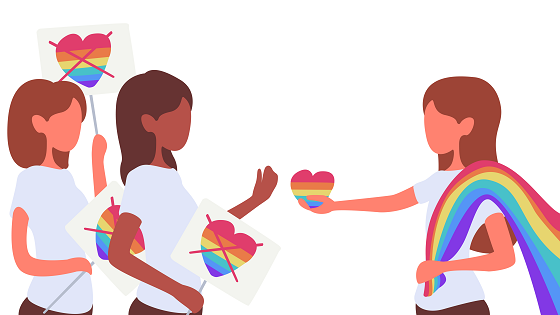
Are you experiencing internalized homophobia?
If you’ve been on this earth for 20+ years, you likely grew up thinking that everyone is heterosexual or straight.
Most of us, if not all, grow up with assumptions that all people are or should be heterosexual (being sexually or physically attracted to a person of the opposite sex).
We grow up believing that heterosexual or cisgender (identifying as assigned at birth especially male or female) persons are the only existing humans. There is little or no mention of gender minorities and other sexual orientations.
This idea is deeply rooted in us and leads to homophobia which is the dislike of or prejudices against Lesbians, Gays, Bisexuals, Transgender, Queer and intersex persons.
Homophobia perpetuates; fear, hate, discomfort, and mistrust against persons identifying as gay. Such prejudice often is a result of conservative religious beliefs, parental teachings, traditional gender norms, and stereotypes that sustain unequal and unfair treatment of people based on a persons’ gender.
What is internalized homophobia?
Internalized homophobia is when a person starts to believe that being homosexual is wrong, evil, or immoral. This can happen to anyone, regardless of sexual orientation, but the focus is mostly on LGBT persons.
Such people start to consciously or unconsciously accept the existing homophobic biases. These people tend to be intolerant, and project stigma to themselves and toward people with same-sex attraction.
Their form of oppression is to completely exclude the needs, concerns, and experiences of the LGBTQ+ persons giving advantage to heterosexual persons. It’s important also to emphasize that internal homophobia can happen to anyone regardless of their sexual orientation.
How it happens:
- Disliking of people who are proudly attracted to persons of same-sex (Gay/Lesbian)
- When one starts to feel ashamed/hide their sexual identity and orientation from the community
- Having fear of being queer or being labeled queer
- Believing that that being homosexual is bad, wrong, or immoral
- Having feelings of self-disgust and self-hatred
How to deal with it:
- Family and Friends: It’s important for homes to be safe spaces where internalized homophobic persons can find compassion and support by talking through their emotions and thoughts.
- Avoid offensive humor: Jokes can be good for laughter although homophobic jokes are dangerous and can cause harm.
- Speak out: Through the struggles, getting our voice and making our stands visible by speaking out against homophobic statements helps one cope.
- Learning: Become best friends with LGBTQ+ resources to understand the unique need, concerns, and how to support diversity
- Celebrating pride: dressing multicolored and being happy of the great progress made creates a less homophobic and environment and helps people feel safer.
- Therapy: Homophobia has effects on one’s mental health, a person can seek counseling from a therapist who has specialized on stigma among the sexual and gender minorities.
What are your thoughts/experiences with internalized homophobia?

Being gay or strait is a…
Being gay or strait is a choice,and everyone is entitled to his/her opinion..,…. notwithstanding tho,we should learn how to adapt,live and respect others opinion….,,.selah
Hi Uche,
It is not a…
Hi Uche,
It is not a matter of choice, it is who people are. I do agree with you that we should respect others and how they choose to live their lives.
This has helped me…
This has helped me appreciate diversity of gender identities and sexual orientations.
Great, Rodgers! I am glad…
Great, Rodgers! I am glad that we have helped you change your perceptions.